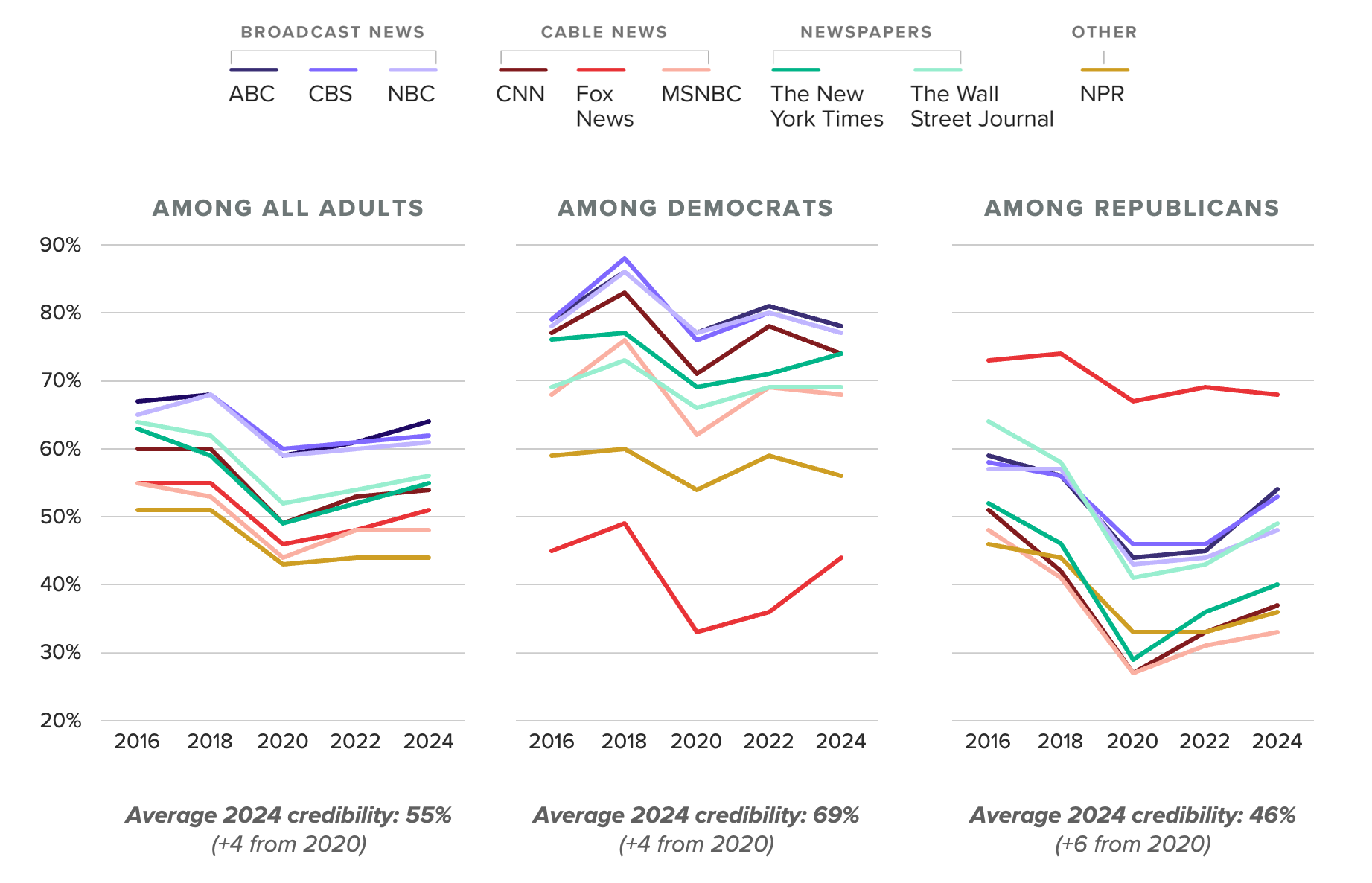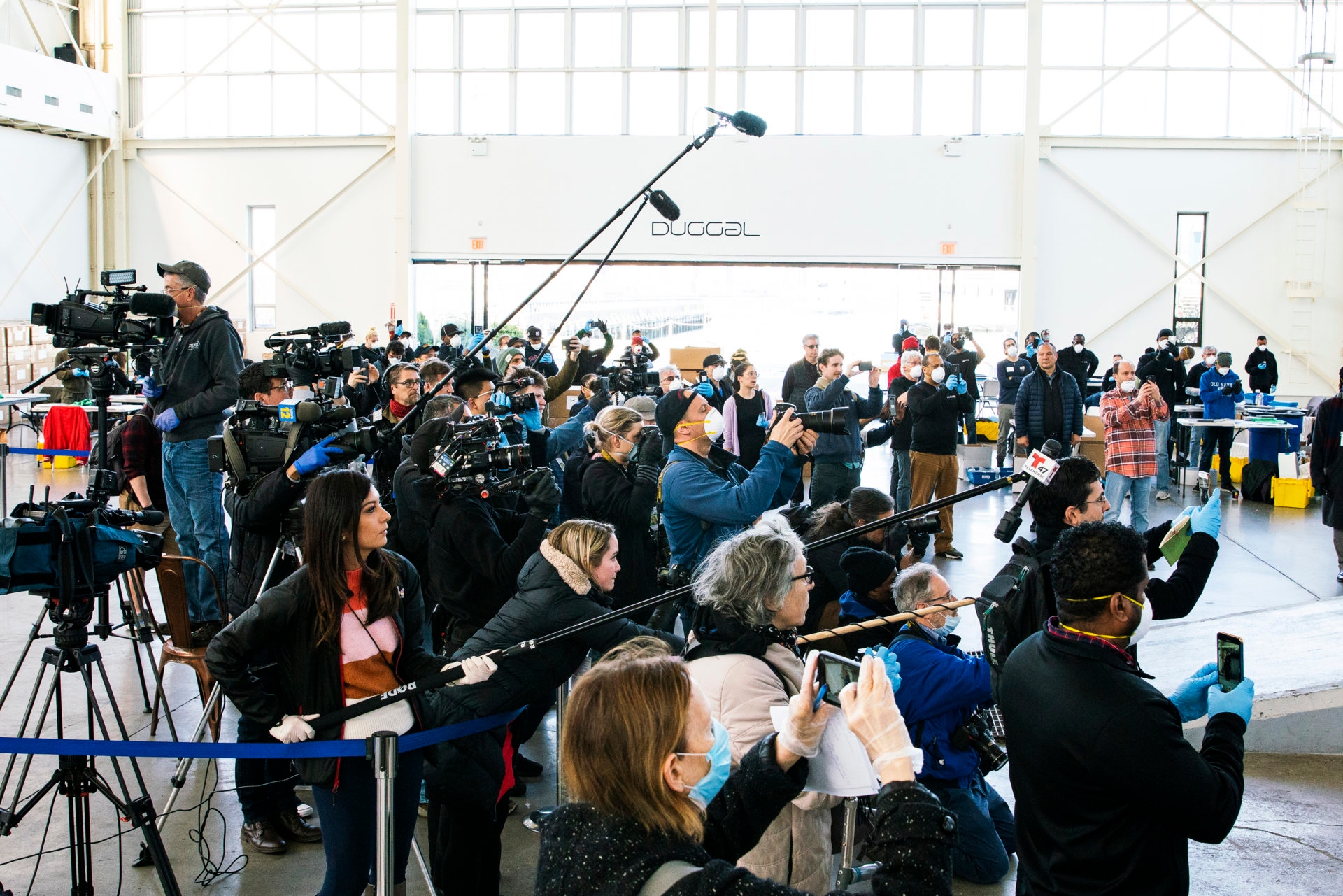U.S. Media’s Credibility Rating Ticks Back Up After 2020 Lows

Key Takeaways
More than half of U.S. adults (55%) found nine major news outlets to be credible, up from 51% who said the same in 2020. Republicans are driving most of this positive change, despite their long-held skepticism of the media.
This positive turn in perception is happening alongside growing trust in all news sources, with social media and podcasts in particular seeing the biggest upswings, especially among younger consumers.
Though trust in the media at large has trended down for decades, the sharpest declines recorded by Morning Consult happened while Donald Trump was still in office, even if he helped juice the media industry’s profit margins. Now, organizations may be more credible in the eyes of the public, but it’s also undergoing a period of financial decline.
Sign up to get the latest global brand, media and marketing news and analysis delivered to your inbox every morning.
The U.S. media’s credibility is no longer in free fall, even if the industry’s finances are. Though the news business boomed during the Trump presidency, its trustworthiness hit new lows; now under a Biden administration, the situations are reversed.
On average, 55% of U.S. adults in a new Morning Consult survey describe nine leading outlets to be at least “somewhat credible,” which is 4 percentage points higher than in 2020. This uptick is driven largely by Republicans, whose perceptions of several outlets increased by double digits.
Perceptions of the media have recovered since 2020
Traditionally, much higher shares of Democrats find news organizations credible, but despite a rebound in 2022, perceptions have dropped again. On the other hand, Republicans are generally less likely to see the news media as credible, but with the media’s focus on a Democratic president since 2021, the group’s views of almost all of the tracked outlets have seen healthy swings upward.
Republicans Help Drive Rebound in Perceptions of Media Credibility

The one exception for both Democrats and Republicans is, interestingly, Fox News. The outlet is among the least trusted among Democrats, but in the years since Trump left office, has seen an 11-point increase in credibility. At the same time, even though it’s historically one of the most trusted for Republicans, after a dip between 2018 and 2020, perceptions have not recovered to former highs.
When Trump was in office, the right-wing outfit was the president’s biggest media ally, touting his policies and defending his behavior to its conservative viewership, which in turn made it less credible in Democrats’ eyes. But since the turbulent end of his presidency which culminated in the Jan. 6 Capitol attack, the relationship between Trump and Fox News has been strained.
For a while, the network’s record-breaking $787.5 million settlement with Dominion Voting Systems — a by-product of its promotion of Trump’s insistence that the 2020 election was stolen — made the former president a persona non grata on its airwaves, and was said to be a reason behind the high-profile ouster of Tucker Carlson, a favorite among Fox’s dedicated Republican viewership.
Those incidents, along with the network’s recent habit of fact-checking Trump’s stolen election claims, may have helped propel Fox’s favor among Democrats, while at the same time tempering Republicans’.
Beyond potential viewers’ political affiliation — of obvious importance to news execs during a presidential year — outlets would be remiss to overlook a concerning lag in perception among young consumers. On average, 46% of Gen Z, a historically distrustful generation, said they found the nine major outlets tested to be credible. That trails far behind millennials (60%), Gen X and boomers (both 55%).
Gen Z is less likely to find every single of the nine outlets credible compared to the average U.S. adult, but TV networks saw the most severe gaps. Even more troublingly, much higher shares of Gen Z said they’ve never even heard of networks like MSNBC, CBS and NBC, which bodes very poorly for the future of broadcast news.
At the same time, trust in news sources is growing
Though they may not be turning to traditional sources of news, younger consumers are helping drive increased trust in social media and podcasts, both of which have become crucial distribution channels for news and will likely continue to grow in importance in the coming years.
Social Media and Podcasts See the Biggest Growth in Trust
Nearly half of Gen Z (49%) now say they trust podcasts as a news source, up from 29% in 2020; 59% of millennials said they trust social media, up from 41% in 2020. Social media in particular is an interesting case where trust and usage are not in lockstep. Even though Gen Z’s trust in social media is among the lowest of all sources, for example, their consumption of the news is by and far happening through social. Unfortunately, that’s not an inverse correlation that other news sources can enjoy, meaning outlets will have to work hard to keep fostering their relationship with Gen Z consumers.
Podcasts saw an even bigger increase in trust, no doubt bolstered by a broader industry pivot from audio to video. Publishers, independent studios and creators have all been making significant pushes to deliver their episodes not only in audio-only format, but video as well. Thus, the shareability of podcasts has been boosted as clips make their way to Instagram and TikTok, growing new audiences among Gen Z and millennials and gaining trust at the same time.
Could credibility and trust in the news dip again?
Though trust in the media has been steadily dropping for decades and no one thing will be the reason for potential future declines, Trump’s criticism of the media was uniquely harsh. While Trump was in office, approval of the then-president correlated with negative views of journalists’ ethics, which then fed into broader perceptions of the media.
Under the current administration, critiques of the media are still fairly frequent, but much less incendiary. Biden, for example, has not told Americans that journalists are the enemy of the people. And with Democrats in control of much of Washington, the tendency of the media to scrutinize whichever party holds the White House appears to have helped news organizations curry some favor with right-leaning Americans, so it’s not a coincidence that public perceptions have rebounded. That may change if Trump is elected for a second term this fall.
At the same time, another Trump occupancy of the White House could bring profits back to organizations that badly need them. The question becomes whether that short-term gain is worth the reputational risk that comes with it.
Amy He leads Industry Analysis at Morning Consult. Prior to joining Morning Consult, Amy served as the executive editor at eMarketer, and was a China reporter for many years. She graduated from New York University with a bachelor’s degree in journalism and East Asian studies. For speaking opportunities and booking requests, please email [email protected].


